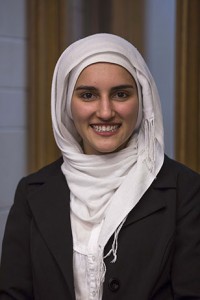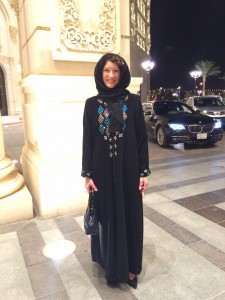Seeing IU’s influence up close in Saudi Arabia
The following guest post was written by Rahaf Safi, who served as IU’s presidential intern in 2013-14 and accompanied IU First Lady Laurie Burns McRobbie during activities in Saudi Arabia. Additional biographical information on Safi is included below.
Like other official IU trips, we started with a briefing on the scheduled events, but this one was a little different. The conversation began with a discussion of the female dress code, because even as non-Saudi women we were required to wear abayas, the traditional garb for women in Saudi Arabia. A separate schedule had been designed for First Lady Laurie Burns McRobbie due to the restrictions on mixed gender gatherings. This was a different experience for both of us, and I had the chance to sit down with her and talk about her impressions of life for women in Saudi Arabia.
We began the trip with a visit to the National Museum. As Mrs. McRobbie noted, it was “women’s day” at the museum and we thought we would be able to remove our abayas. But due to the presence of male security guards and other workers, we had to keep them on throughout the tour. The tour started with the Stone Age gallery and transitioned to the empires and kingdoms that existed up to the pre-Islamic era and during the Islamic period, which then led to the founding of the Kingdom of Saudi Arabia. It was fascinating to see some of the artifacts from the country and to see the emphasis placed on preserving the history of the Arabian Peninsula.
On Monday evening, we attended a dinner given in honor of Mrs. McRobbie by Dr. Maha Alenzy (’04 BS Biology/’06 Language Education), for IU alumnae living in Riyadh. The women who gathered at Dr. Alenzy’s home were both her friends and colleagues as well as graduates of Indiana University. Mrs. McRobbie reflected that once we were inside and could shed our abayas, it felt like any other gathering of alumni, some of whom were meeting for the first time. The women shared the positive experiences they had at IU and the impact their education had on their careers and lives in Riyadh. The IU alumnae experienced a strong sense of community in Bloomington and were happy to have a continued connection when they came back home. As a recent IU alumna, I enjoyed reminiscing about my time at IU with other IU graduates and was happy to hear how far they’ve come along. Many of them are prominent and well-known medical doctors and researchers who are helping to change the image of Saudi women.
One of the guests at Dr. Alenzy’s was Dr. Huda M. Saleh Al-Ameel, rector of Princess Nora Bint Abdul Rahman University (PNU), at a capacity of 60,000 the largest women’s university in the world. Dr. Al-Ameel invited us to visit the university on Tuesday morning. Mrs. McRobbie met with the rector for an hour to exchange information on respective university programs and potential areas of cooperation.
“The rector was very interested in our Arabic language and culture programs, in our new efforts in design, and particularly in our Lilly Family School of Philanthropy. She is actively engaged in building up PNU’s academic quality and its outreach to alumnae,” said Mrs. McRobbie.
After the meeting, we toured the extensive and beautiful PNU campus, which is known for its use of Islamic art. Built in 2011 and covering 8 million square meters, it includes 600 high-tech buildings, dormitories and recreation facilities, a medical school and hospital, housing for faculty and their families, and much more. The campus is designed so that woman can dress comfortably and remove their abayas and hijabs.
On Tuesday afternoon, Mrs. McRobbie met with Lubna Olayan, (’79 MBA, Business), CEO of Olayan Financing Group and on the Forbes list of the 100 most powerful women in the world and second most powerful in the Middle East. Ms. Olayan also directs the Olayan Charitable Trust. Ms. Olayan and Mrs. McRobbie discussed philanthropic traditions in Saudi Arabia as well as Ms. Olayan’s commitment to higher education.
“Her leadership and dedication to giving back to the community are inspiring, and she is in many ways a role model for the future of Saudi business and for Saudi women,” Mrs. McRobbie said.

Rahaf Safi accompanied IU First Lady Laurie McRobbie on the first lady’s various meetings in Saudi Arabia.
The last event of our itinerary on Tuesday evening was a dinner hosted by Dr. Nora Aladwani, a faculty member at King Saud University and member of the Shura Council, at her home. Guests included several members of the first group of women to serve on the Shura Council. The council is a legislative body appointed by the king that advises on a range of issues. In 2013, in a historic move, the king decreed that a minimum of 20 percent of the Shura Council members would be women, and it was a great honor to meet some of these pathbreakers. The council members shared that they received a lot of support from their families and male colleagues at the Shura Council, who are also guiding them on the functions of the council. This major reform to the structure of the council has also led to some challenges, but, as Mrs. McRobbie commented, “this first class of female Shura Council members are immensely impressive, intelligent and strong women who are signaling a new path forward for Saudi Arabia.”
While the trip changed many perceptions I had of the Saudi culture, it also reinforced much of the discussion found in the media. The ability of women to drive was inevitably discussed at both dinners, and there was a range of opinion on what the law should be. Mrs. McRobbie summed it up by saying, “What they all agreed on was that it is not the most important issue, but one of many. Their determination to address these issues is inspiring.”
I am proud to be a graduate of a university that values the exchange of ideas and education on an international platform. It was an exciting opportunity to accompany the first lady on her meetings and see IU’s influence across the world.
About Rahaf Safi:
Rahaf Safi graduated from Indiana University in May 2014 with a Bachelor of Arts in political science and philosophy and a certificate from the Political and Civic Engagement program. She served as IU’s presidential intern in 2013-14 with a focus on initiatives related to IU’s international strategic partnerships and the School of Global and International Studies.
In 2014, she was a joint recipient of the Herman B Wells Senior Recognition Award, IU Bloomington’s top academic award for undergraduates. The award is given to an outstanding senior who has excelled academically and has established himself or herself as a leader within the IU community.
In April 2013, she was awarded a prestigious Truman Scholarship, one of only 62 U.S. students to receive an award that recognizes outstanding student leaders who are committed to public service. Deeply involved in civic activities, she founded and served as president of the IU chapter of Oxfam America, an organization dedicated to finding solutions to global hunger, poverty and injustice. She was an intern during the summer of 2013 with the Association of Female Jurists in Dakar, Senegal, and studied at the Université Cheikh Anta Diop in Dakar. She was also an associate justice of the IU Supreme Court and represented the court on the Commission on Multicultural Understanding.
The Wells Senior Recognition Award recognizes excellence in academic achievement and excellence of contribution to the campus community through leadership and participation in campus activities. It is the campus’s top academic award for undergraduates.
Tags: abaya, Huda M. Saleh Al-Ameel, IU Alumni Association, King Saud University, Laurie Burns McRobbie, Lilly Family School of Philanthropy, Lubna Olayan, Maha Alenzy, National Museum, Olayan Financing Group, Princess Nora University, Rahaf Safi, Riyadh, Saudi, Saudi Arabia, Shura Council



